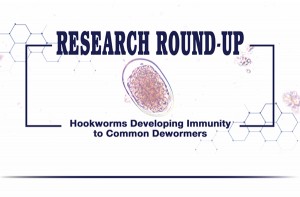Research Round-Up: Hookworms Developing Immunity to Common Dewormers
Click here to read the complete article
194 – September, 2022
 By Caroline Coile
By Caroline Coile
Researchers from the University of Georgia College of Veterinary Medicine report what some dog breeders already suspected: hookworms are becoming resistant to drugs that formerly killed them. In fact, hookworms are evolving to resist all three drugs currently in use. The research team looked at retired racing greyhounds, because the sandy tracks and paddocks are conducive to the hookworm life cycle. Four out of five dogs in their study were positive for hookworms, but according one researcher, the remainder were probably also positive but had the worms “hiding” in tissue where they won’t reproduce and shed eggs until the infection worsens and leaks into the dog’s intestines.
Alarmingly, most of these dogs remain positive even after treatment with any of the three prescribed hookworm medications. Almost all the dogs’ fecal samples tested positive for a mutation that enables hookworms to survive treatment with benzimidazoles, one of the three commonly-used dewormers. A molecular test does not yet exist to test for the resistance to the other two types of dewormers, but other types of testing showed that the hookworms were resistant to those drugs, as well.
Greyhound farms are ideal environments for parasites to develop resistant strains because of the great number of dogs present, creating a large population of worms in which mutations can arise and evolve. When these greyhounds are then placed in the pet population it spreads the mutated hookworms into the general environment, and eventually to the general dog population.
Click here to read the complete article
194 – September, 2022

Short URL: https://caninechronicle.com/?p=243716
Comments are closed











